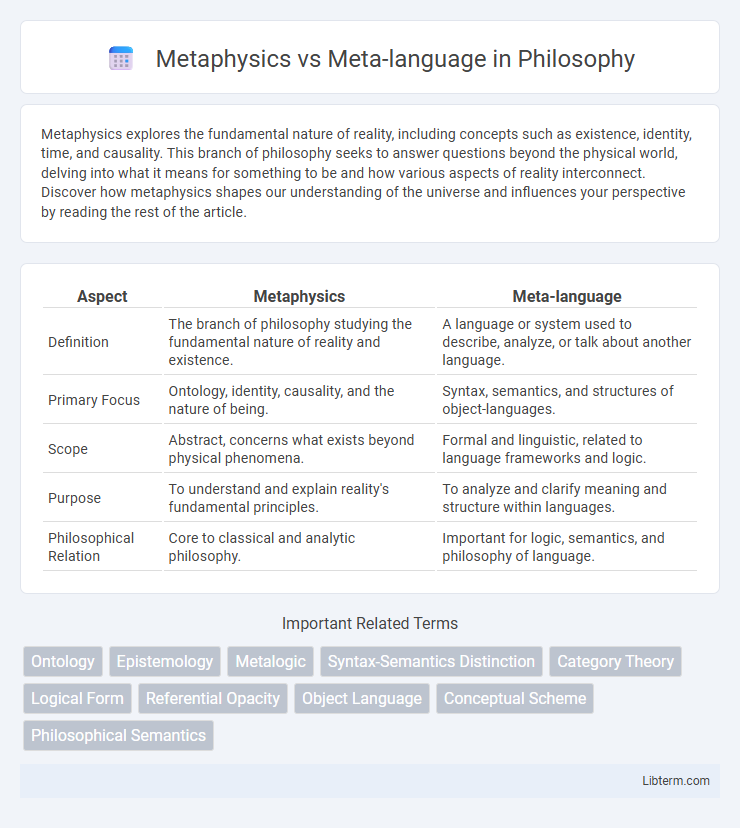Metaphysics explores the fundamental nature of reality, including concepts such as existence, identity, time, and causality. This branch of philosophy seeks to answer questions beyond the physical world, delving into what it means for something to be and how various aspects of reality interconnect. Discover how metaphysics shapes our understanding of the universe and influences your perspective by reading the rest of the article.
Table of Comparison
| Aspect | Metaphysics | Meta-language |
|---|---|---|
| Definition | The branch of philosophy studying the fundamental nature of reality and existence. | A language or system used to describe, analyze, or talk about another language. |
| Primary Focus | Ontology, identity, causality, and the nature of being. | Syntax, semantics, and structures of object-languages. |
| Scope | Abstract, concerns what exists beyond physical phenomena. | Formal and linguistic, related to language frameworks and logic. |
| Purpose | To understand and explain reality's fundamental principles. | To analyze and clarify meaning and structure within languages. |
| Philosophical Relation | Core to classical and analytic philosophy. | Important for logic, semantics, and philosophy of language. |
Understanding Metaphysics: Core Concepts
Metaphysics explores the fundamental nature of reality, addressing concepts such as existence, causality, time, and space through ontological and cosmological inquiries. Meta-language involves a language used to describe, analyze, or manipulate another language, focusing on syntax, semantics, and the structure of expressions rather than reality itself. Understanding metaphysics requires grasping its core concepts of being, substance, and universals, distinguishing it from meta-language, which centers on linguistic frameworks rather than existential principles.
Defining Meta-language in Philosophy
Meta-language in philosophy refers to a language used to describe, analyze, or discuss another language, known as the object language, enabling precise examination of linguistic structures and meanings. It plays a crucial role in logic, semantics, and the theory of language, allowing philosophers to clarify concepts, resolve ambiguities, and address paradoxes that arise within the object language. Distinguishing meta-language from metaphysics, which explores the nature of reality and existence, highlights its function as a tool for linguistic and conceptual analysis rather than ontological inquiry.
Historical Origins of Metaphysics and Meta-language
Metaphysics originated with Aristotle's exploration of "first philosophy," addressing fundamental questions about existence, reality, and being beyond the physical world. Meta-language emerged in the 20th century through advancements in logic and linguistics, focusing on a language used to describe, analyze, or interpret another language. While metaphysics traces back to ancient philosophical inquiry, meta-language developed primarily through formal systems and the study of language structure and semantics.
Key Theoretical Differences
Metaphysics investigates the fundamental nature of reality, existence, and being, addressing questions about what entities exist and their properties. Meta-language, in contrast, is a language or system used to describe, analyze, or interpret another language or formal system, focusing on the structure and semantics of linguistic expressions. Theoretical differences hinge on metaphysics' ontological commitments versus meta-language's role in linguistic or logical representation and analysis.
Ontology vs Linguistic Structure
Ontology in metaphysics examines the nature of being and existence, defining categories of reality and their relations. Meta-language, grounded in linguistic structure, analyzes language itself, providing tools to describe and interpret object languages. The distinction centers on ontology's focus on what exists versus meta-language's role in structuring and clarifying statements about those existents.
The Roles of Metaphysics and Meta-language in Analysis
Metaphysics investigates the fundamental nature of reality, exploring concepts such as existence, causality, and identity to construct frameworks that underpin philosophical analysis. Meta-language serves as the toolset for describing, analyzing, and clarifying the structure and meaning of language used within metaphysical arguments, enabling precise communication and critical evaluation. Together, metaphysics provides the subject matter while meta-language offers the linguistic apparatus essential for dissecting and interpreting complex philosophical ideas.
Influence on Modern Philosophical Thought
Metaphysics explores the fundamental nature of reality, existence, and being, shaping foundational questions in modern philosophical thought about ontology and cosmology. Meta-language, a system used to describe or analyze language, profoundly influences contemporary philosophy by enabling clearer discourse on semantics, logic, and the structure of scientific theories. Their combined impact advances critical inquiry in epistemology and the philosophy of language, fostering refined analytical frameworks and interpretative methods.
Common Misunderstandings Explained
Metaphysics studies the fundamental nature of reality, existence, and being, while meta-language refers to a language used to describe, analyze, or discuss another language. Common misunderstandings arise when people confuse metaphysical discussions about what exists with meta-linguistic analysis of linguistic structures and meanings. Clarifying this distinction prevents conflating ontological inquiry with linguistic or logical frameworks in philosophy and language studies.
Applications in Contemporary Debates
Metaphysics explores fundamental concepts such as existence, causality, and reality, providing a foundation for debates in philosophy of mind, cosmology, and ethics where questions about being and substance are central. Meta-language studies the structure and use of language to describe or analyze other languages, playing a crucial role in logic, linguistics, and computer science, especially in semantic theory and programming language design. Contemporary debates often intersect these fields when addressing how language affects conceptual frameworks about reality, particularly in philosophy of language and artificial intelligence research.
Future Directions in Metaphysics and Meta-language
Future directions in metaphysics emphasize exploring the implications of quantum mechanics and the nature of consciousness, aiming to refine ontological frameworks that adapt to scientific advancements. In meta-language studies, research focuses on enhancing semantic precision and developing dynamic models to better capture language evolution and contextual meaning shifts. Both fields increasingly integrate computational tools and formal logic to bridge abstract theory with practical applications in artificial intelligence and cognitive science.
Metaphysics Infographic

 libterm.com
libterm.com